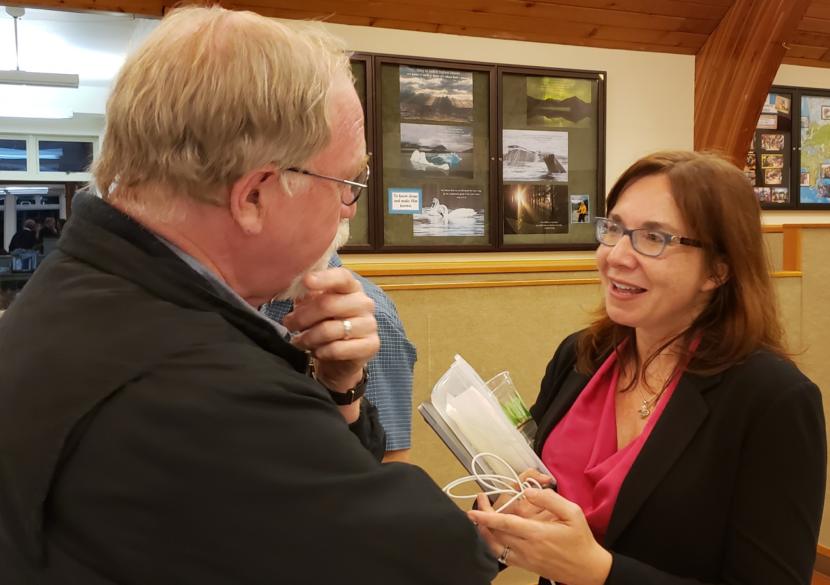
National media and mainstream science organizations celebrate the scientist and evangelical Christian Katharine Hayhoe for her ability to reach people who reject mainstream climate science.
In Juneau, about 400 people packed a university lecture hall and a church to hear her speak on Sept. 13. I went to both talks and wanted to find out if she was converting skeptics, or preaching to the choir.
Her first talk was at the University of Alaska Southeast. It was secular, and she talked about combatting climate change silence.
Hayhoe’s second talk was at Chapel by the Lake, an Evangelical Presbyterian church. It had an explicitly Christian angle. Here’s how she introduced herself there:
“So as you know, I am a climate scientist, I’m also a Christian. And people often ask, ‘Well, you know, what comes first the science or the faith?’ And I say, ‘Well, the reason I’m a climate scientist is because I’m a Christian.’”
The Texas Tech University professor illustrates and punctuates her talks with data visualizations, short animations and photos. Think “An Inconvenient Truth.” But with a snappier pacing and without Al Gore’s political baggage.
For the secular crowd, Hayhoe’s talk wasn’t about climate science per se. Rather the science of public opinion about climate science.
In one graph, she highlighted how political identity seems to affect how we perceive temperature. The background is that January 2017 was 8 degrees warmer than average in New Hampshire. In February, a social scientist polled New Hampshire and asked, “Was January warmer than average in New Hampshire, as measured by your own thermometers?”
Four out of five people who voted for Hillary Clinton in the last presidential election thought it was warmer than average. But Donald Trump voters were split 51-49.
“Now, here’s the question: Does a thermometer genuinely give you a different answer, depending on how you vote?” Hayhoe asked, incredulously. Laughter spread through the lecture hall.
“No! It doesn’t! So they were looking at the same numbers. But when we talk about warmer, warmer is associated with global warming, global warming is associated with what? The left-hand side of the political spectrum. And so we can’t say it’s true if it’s counter to who we are.”
The talk at Chapel by the Lake was about equal parts climate science and biblical backstopping for why Christianity and climate action are compatible. She dropped references to a gnostic heresy, Hebrew etymology, Genesis, and Matthew.
“And we’re reminded in Psalm 24: Who does this garden belong to? Who does this Earth belong to? It belongs to the Lord. … Think about the planet. What is the planet? It is our gift from God. Who are we? We are the protectors. We are the keepers. We are the gardeners and stewards.”
By failing to act on climate change, she said Christians “are not just throwing the baby out with the bathwater, we’re throwing everything that the Bible tells us out with the bathwater.”
During Hayhoe’s talks, there weren’t any vocal climate science skeptics in the audience.
There were churchgoers like born-again Christian Sue Badilla, looking for ways to combat skepticism within their home congregations.
“I wanted a little more ammunition for discussing climate change with other Christians and other people,” Badilla said. “So this was good. It helped me to see that there are lots of organizations out there, faith-based organizations that are, are working on finding ways to just help our planet. … I’m definitely going to share what she had to say with other people.”
Loyd Platson came from Sitka for Hayhoe’s talks. He’s active in St. Peter’s by the Sea Episcopal Church.
“I think the information that she shared was kind of eye opening in terms of how to have a conversation, how to start a conversation and why it’s important,” Platson said.
One of his takeaways was to start by finding common ground. He walked through a possible avenue.
“You know, what do we have in common? … Say the salmon is an important industry. And in Alaska, we both believe that. And we’ve seen how the impact of just what’s happened lately in Sitka, the lack of rain affected the lowering of the stream levels, which affected the salmon coming up into the stream. So we both can agree on that. … What are some possible solutions? What are some possible causes that we see? And then we can have the conversation about climate change.”
Platson had a specific relative in mind he wanted to work on. I circled back with him recently. It didn’t go as well as he hoped.
“It was a better discussion than previous,” Platson said. “At least, I kept my side pretty calm. But, like I say — some ingrained thoughts and beliefs that there isn’t climate change going on.”
That said, Hayhoe finishes her talks on hopeful notes.
“The biggest uncertainty in future projections is not the science, it’s not the models we use. The biggest uncertainty is us,” she said. “So when people say it’s too late, I say it is absolutely not too late. We have the ability to make a choice now that will determine our future.”
Hayhoe said she held 29 events around Alaska last month. She stacks up lots of events to make the travel efficient, and she even buys offsets for the greenhouse gases her travel generates.
